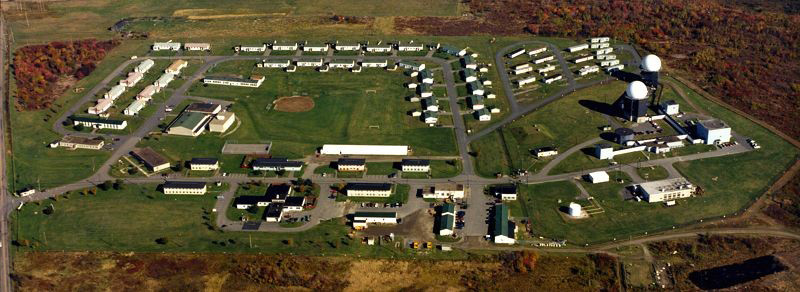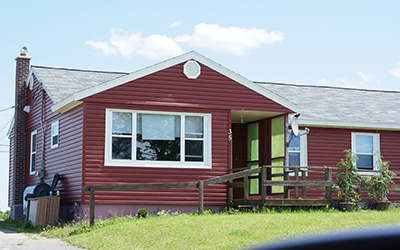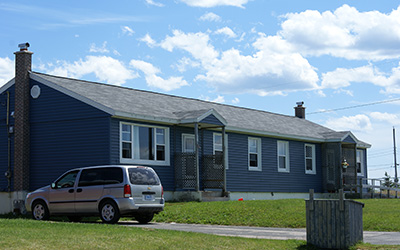
Pine Tree Park Estates: Transforming a brownfield into a net zero energy community
Previously a military radar base, Pine Tree Park Estates is Cape Breton's inaugural net-zero energy community, having transitioned from fossil fuels with renovated systems and solar panels to notably reduce utility expenses.
About Pine Tree Park Estates
Previously a military radar base, Pine Tree Park is Cape Breton's inaugural net zero energy community, having transitioned from fossil fuels with renovated systems and solar panels, setting benchmarks for future projects. Rising energy costs are impacting not only companies' budgets, but the daily lives of tenants living in affordable housing.

About New Dawn Enterprises
Since 1976, New Dawn, a community-focused social enterprise, has offered affordable housing, home care, and diverse programs including arts and food security. They manage five commercial spaces and 215 residences, with 27 units dedicated to supporting those with mental illness.
"This is a significant transformation for Cape Breton. We really want to encourage other organizations to know that these types of projects are possible and is not out of their reach, regardless of scale."
– Erika Shea, President and CEO of New Dawn Enterprises.
Project information and background
Project profile

Name: Pine Tree Park Estates
- Owner: New Dawn Enterprises
- Location: Military Road, Sydney, Nova Scotia
- Total area: 80 acres
- Area occupied by building: 15 acres
- Number of homes: 28 homes
- Number of affordable housing units: 20
- Former Department of National Defence radar base, decommissioned in the 1990s.
- Project value: $3.5 M
- Return on Investment ROI: $30,000 (annual)
- Duration: 2018-2023
- Energy savings: 51.5%
Energy conservation measures (ECMs) used

High-efficiency heating and cooling systems (all units)
- High-efficiency hot water systems (all units)
- Efficient heat recovery ventilation (HRV) systems (all units)
- High-efficiency windows (where required)
- Insulation upgrades (all units)
- Air sealing (all units)
- Installation of 700 kW solar array (1,800 solar panels) (all units)
Context
Before the project:
Pine Tree Park's 28 residences averaged yearly energy costs of $90,000, about $3,200 each, paid directly by residents.
After the project:
Through energy retrofits and solar systems, the project notably reduces utility expenses. Residents will mainly cover a minor solar maintenance fee for inspections and occasional repairs.
Parties involved in development
- Developer: New Dawn Enterprises
- Partners and funders: Atlantic Canada Opportunities Agency (ACOA), Environment and Climate Change Canada (ECCC), Efficiency Nova Scotia, FCM’s Green Municipal Fund, Nova Scotia Natural Resources and Renewables
- Engineering and construction companies: Aucoin Renovations (retrofits), ARL Mechanical (retrofits), Lynk Electric (solar)
- Consultants: Verschuren Centre for Sustainability in Energy and the Environment
- Project manager: New Dawn Enterprises
- Energy manager: Verschuren Centre
Funding sources
| Funding source | Description | Amount | Percentage of total budget |
|---|---|---|---|
| FCM’s Green Municipal Fund | Grant | $500,000 | 14% |
| New Dawn Enterprises Limited | Cash | $181,534 | 5% |
| Atlantic Canada Opportunities Agency | Grant | $979,200 | 28% |
| Environment and Climate Change Canada: Low Carbon Economy Fund | Grant | $817,753 | 23% |
| Efficiency Nova Scotia | Grant | $558,713 | 16% |
| Nova Scotia Natural Resources and Renewables | Grant | $500,000 | 14% |
| Total | $3,537,200 | 100% |
*The grants and financing leveraged for this project were secured over 24 months.
Showing tangible progress
- Building effective partnerships: New Dawn partnered with the Verschuren Centre for sustainable energy research to enhance their building retrofit. This collaboration offered technical insights, examined options, and emphasized the importance of strategic partnerships in energy efficiency projects. “There is nothing like knowing that you’re not alone and you have someone who also has your best interest in mind but also has the ability to answer your technical questions on the spot.” – Erika Shea.
- Navigating funding complexities: Securing funds from diverse federal and provincial sources was vital. Yet, managing these varied sources was complex. New Dawn used spreadsheets to effectively track funding, ensuring organization and transparency.
- Demonstrating progress: Regular updates to the Board of Directors were critical to highlight progress, discuss funding status, and gather crucial feedback for the project's direction.
- Ensuring meaningful stakeholder engagement: Regular community meetings kept residents informed, addressed concerns, and fostered trust and collective ownership in the project. “If we hadn’t done those community meetings, we’d probably have had a lot more individual calls and some concerns from tenants.” – Erika Shea.
- Budget flexibility: An important consideration in large projects is maintaining flexibility in design to adapt to available budgets, especially when a significant portion of the budget depends on external funding.
Early strategies to engage decision-makers:
- Craft a solid business case: Showcase both financial and ecological benefits to rally stakeholders around the project.
- Showcase funding options: Emphasize potential funding sources, enhancing confidence in the project's feasibility.
- Share knowledge: Distribute relevant research and articles to enlighten decision-makers on energy efficiency.
- Hold informative sessions: Organize meetings with leaders to address queries, discuss finances, and mitigate risks, fostering understanding and support.
In the evolving landscape of energy and climate policies, New Dawn Enterprises stands as a role model for achieving sustainability in affordable housing. Their experience shows that, despite challenges faced, moving toward energy efficiency is not only achievable but also economically and socially rewarding.
For more information about Pine Tree Estate’s decision-making process, read the interview with Erika Shaw, President/CEO of New Dawn Enterprises
Want to explore all GMF-funded projects? Check out the Projects Database for a complete overview of funded projects and get inspired by municipalities of all sizes, across Canada.

